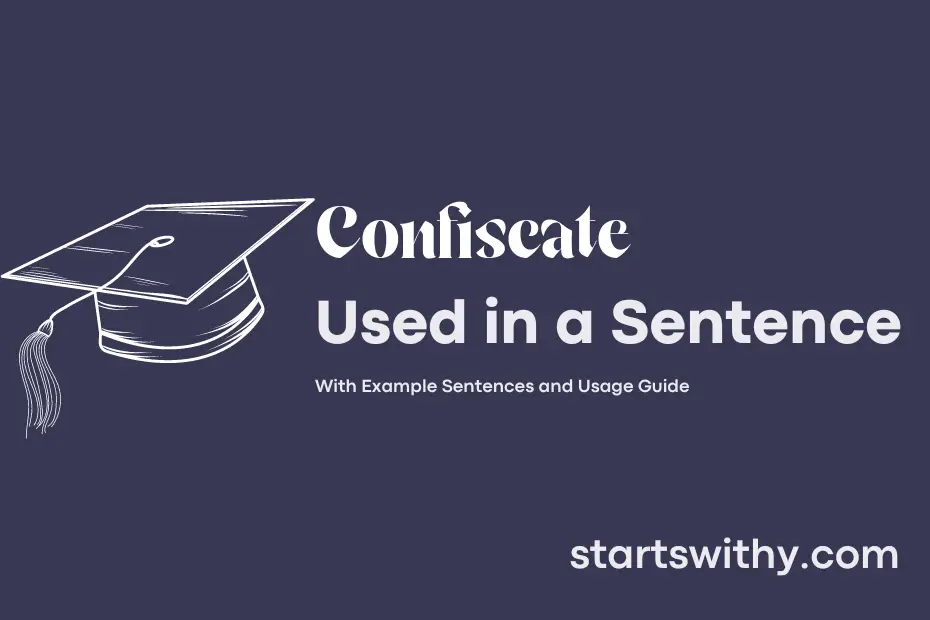Confiscate is a verb that means to seize or take possession of something against the owner’s will, usually as a punishment or as a result of legal authority. This action is commonly done to enforce laws, regulations, or as a penalty for violating rules or norms.
When an item is confiscated, it is removed from the possession of its owner and typically placed under the control of the confiscating authority. This can happen in various situations, such as at customs, in schools, during police operations, or in other official capacities.
7 Examples Of Confiscate Used In a Sentence For Kids
- The teacher will confiscate toys if we don’t share.
- We should not bring toys that can be confiscated.
- It is not good to confiscate someone else’s things.
- Always ask before taking things to avoid confiscation.
- Remember, the teacher will confiscate anything that distracts from learning.
- Let’s keep our desks tidy so nothing gets confiscated.
- If we follow the rules, nothing will be confiscated from us.
14 Sentences with Confiscate Examples
- The teacher threatened to confiscate our phones if we didn’t put them away during the lecture.
- Campus security will confiscate any unauthorized items found during random dormitory inspections.
- The librarian will confiscate any unattended belongings left at the study tables.
- Student council members have the authority to confiscate noise-making items during quiet hours in the hostel.
- The college administration may confiscate fake identity cards used to gain unauthorized access to the campus.
- The proctor decided to confiscate the cheat sheets found hidden in the students’ notebooks during the exam.
- The hostel warden warned that they would confiscate any cooking appliances not approved for use in the dormitories.
- The college bus driver will confiscate any alcohol brought on board during the trip.
- The gym instructor threatened to confiscate the student’s membership card if they continued to disregard the facility rules.
- Security personnel will confiscate any unauthorized substances found during bag checks at the entrance gates.
- The college authorities reserve the right to confiscate electrical appliances that may pose a safety hazard in the dormitory rooms.
- The campus cafeteria staff may confiscate food items from students attempting to bring outside food into the dining hall.
- The college security guard had to confiscate a student’s fake ID when they attempted to enter a restricted area during an event.
- The course proctor will confiscate any unauthorized study materials brought into the examination hall.
How To Use Confiscate in Sentences?
To use “Confiscate” in a sentence, follow these steps:
-
Understand the meaning of Confiscate: Confiscate means to take away something from someone as a penalty or legal seizure.
-
Choose the object to be confiscated: Decide what you want to take away from someone or seize legally.
-
Formulate the sentence: Start by identifying who is confiscating what from whom. For example, “The police decided to confiscate the illegal drugs from the suspect.”
-
Use the word correctly: Place the word Confiscate in your sentence in the appropriate location. Remember that it is a verb and should be used accordingly.
-
Check your sentence for clarity: Ensure that your sentence accurately conveys the act of seizing or taking away something.
-
Practice makes perfect: The more you practice using the word Confiscate in sentences, the more comfortable you will become with its proper usage.
-
Seek feedback: Have someone check your sentences to confirm that you are using Confiscate correctly.
By following these steps, you can effectively use the word Confiscate in a sentence with confidence. Practicing using the word in various contexts will help you become more proficient in incorporating it into your vocabulary.
Conclusion
In summary, the term “confiscate” refers to the action of seizing someone’s property due to a legal authority taking control of it. This can happen in various situations, such as illegal activities, security concerns, or failure to comply with regulations. For instance, if a person is caught smuggling illegal goods, the authorities may confiscate the items as part of their law enforcement actions. Similarly, if someone is found to be in possession of counterfeit currency, the fake money can be confiscated to prevent further circulation and potential harm to the economy.
Overall, the word “confiscate” underscores the power of legal bodies to repossess property for public interest or to uphold the rule of law. Understanding when and why confiscation occurs is important in maintaining order, deterring criminal activities, and ensuring compliance with regulations.



